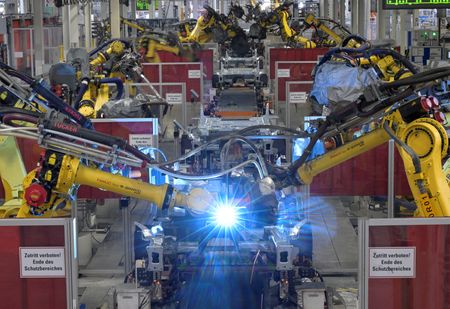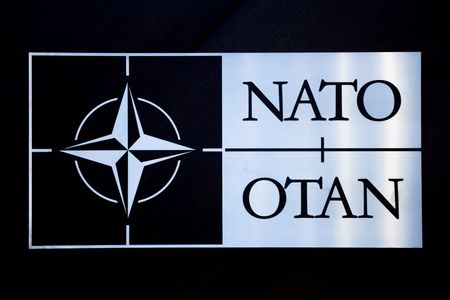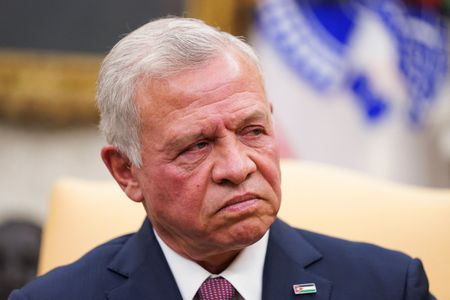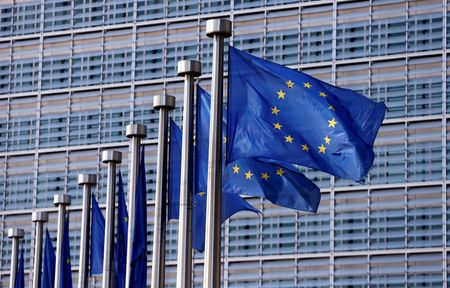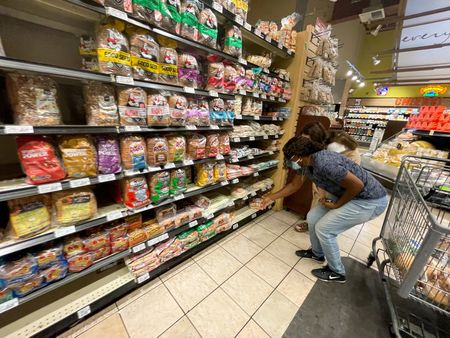By Andrea Shalal and David Lawder
WASHINGTON (Reuters) – U.S. President Donald Trump’s administration will announce reciprocal tariffs on every country that charges duties on U.S. imports by Thursday, the White House said, a move that will ratchet up fears of a widening global trade war and threaten to accelerate U.S. inflation.
Trump’s latest round of market-rattling tariffs will be announced before India Prime Minister Narendra Modi’s visit on Thursday, White House spokeswoman Karoline Leavitt said at a Wednesday briefing.
Trump had said on Monday that he would announce reciprocal tariffs over the following two days and that he was also looking at separate tariffs on cars, semiconductors and pharmaceuticals.
Republican U.S. House of Representatives Speaker Mike Johnson told Reuters on Wednesday that he believed Trump is considering exemptions that would include the automotive and pharmaceutical industries, among others.
“But I’m not certain. You have to wait, ask the White House about that,” he said. The White House did not immediately respond to a request for comment.
Economists broadly see tariffs as presenting more upside risk to inflation than not, and there are signs that U.S. inflation is heating up. Bureau of Labor Statistics data released on Wednesday showed consumer prices increased in January by the most in nearly 1-1/2 years.
The president stunned markets on Monday by announcing tariffs on all steel and aluminum imports beginning on March 12. The plans drew condemnation from Mexico, Canada and the European Union, while Japan and Australia said they were seeking exemptions from the duties.
The news sent industries reliant on steel and aluminum imports scrambling to offset an expected jump in costs.
Trade ministers of the 27-country EU met by video conference on Wednesday to discuss their response. The EU will prioritize negotiations over retaliatory countermeasures for now in an effort to avoid a damaging trade war, comments from officials following the meeting signaled.
An EU government official said ministers discussed potential responses, including reinstating the countermeasures imposed in 2018 on products like bourbon and Harley-Davidson motorcycles in response to the first Trump administration’s tariffs on steel and aluminum.
Those measures were suspended following an agreement with the Biden administration.
An EU diplomat said it was time to be “cool-headed” with a month to go before the tariffs take effect.
EU trade chief Maros Sefcovic spoke on Wednesday with Hassett, Commerce Secretary nominee Howard Lutnick and U.S. Trade Representative nominee Jamieson Greer.
HIGHER PRICES
Last week, Trump imposed an additional 10% tariff on Chinese goods, effective February 4, with Chinese countermeasures taking effect this week.
He delayed a 25% tariff on goods from Mexico and Canada until March 4 to allow negotiations over steps to secure U.S. borders and halt the flow of the drug fentanyl.
Some U.S. workers welcomed Monday’s metal tariffs, but many manufacturing-heavy firms expressed deep concern, warning the hike would reverberate across supply chains. Executives from companies including supermarket chain Ahold Delhaize and Siemens Energy said tariffs would lead to higher prices.
Europe’s steelmakers are also worried that U.S. tariffs will lead to a flood of cheap steel into Europe. French steelmaker Aperam urged Brussels to intervene to curb imports if that happened, while Austria’s specialty steelmaker voestalpine called on the EU to take immediate countermeasures.
Australia’s industry minister, meanwhile, said the nation’s plan to boost “green” aluminum exports would not be derailed by the threat of U.S. tariffs.
“The world has a high demand for our aluminum; we need it as part of the transition to net zero,” Ed Husic told reporters at the National Press Club in Canberra. “The question is, for our American friends, do you really want to pay more for that product that you’ve got a big demand for?”
Canadian Prime Minister Justin Trudeau, speaking to reporters in Brussels, said some Americans would lose their jobs and U.S. growth would suffer if the U.S. imposestariffs on imports of Canadian steel and aluminum.
A group of Canadian provincial leaders were expected to meet with Trump at the White House on Wednesday, sources told Reuters.
MONUMENTAL UNDERTAKING
Wednesday’s Labor Department data showed price increases were broad-based across items of daily household consumption, covering everything from gasoline, up 1.8%; to shelter, up 0.4%; to eggs, up 15.2%, the largest increase in nearly a decade.
“Tariffs can still be used as a bargaining tool to get some concessions from other countries, but the political optics of putting even a little upward pressure on consumer prices via tariffs wouldn’t be great for the Trump administration,” Ryan Sweet, Chief U.S. Economist at Oxford Economics, wrote after the release.
In an interview on Wednesday with CNBC, Trump trade adviser Peter Navarro downplayed the negative impact of the expected tariffs, arguing that duties imposed during Trump’s first term did not send inflation soaring and export-dependent producer economies often lowered their prices to prevent losing market share.
Trade experts say structuring the reciprocal tariffs that Trump wants poses big challenges for his team.
Trump officials could opt for a more easily implemented flat 10% or 20% tariff rate, or a messier approach that would require separate tariff schedules matching U.S. tariffs to each other country’s rates, said William Reinsch, senior fellow at the Center for Strategic and International Studies.
Damon Pike, a trade specialist and principal with the U.S. division of accounting firm BDO International, said the reciprocal tariffs that Trump envisioned would be a monumental undertaking, given that each of the 186 members of the World Customs Organization had different duty rates.
“It’s almost an artificial intelligence project,” he said.
(Reporting by Andrea Shalal and David Lawder in Washington; Additional reporting by Susan Heavey, Doina Chiacu and Katherine Jackson; Editing by Alex Richardson and Nick Zieminski)

